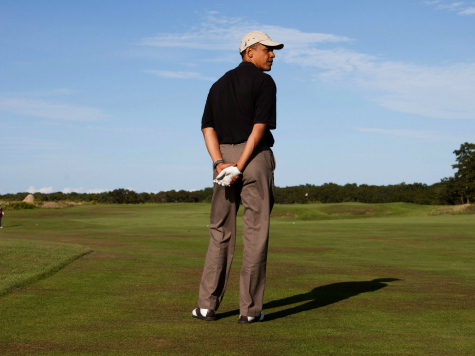
In politics, gallons of ink and countless hours of argument and debate can be swept aside or solidified by a single inflection point. Carter battling the “killer rabbit,” Reagan thundering that he “paid for this mic” or Bush prematurely swaggering beneath a “mission accomplished” sign cemented voter perceptions far more than countless opinion writers or pundits were able to achieve. Moments like these define a Presidency. Obama’s moment came as he reached for a driver, moments after speaking to the world about the beheading of American journalist James Foley.
For years, pundits argued that Obama was preternaturally aloof and detached. Journalists in DC wrote countless stories about how little Obama interacted with lawmakers. He preferred the company of celebrities, former athletes and stereotypical “public intellectuals.” Foreign policy mavens worried that America, under his leadership, was receding from the world.
Political observers noted that as the economy continued to struggle through six years of his tenure, Obama and his team had no “plan B” to boost growth. His policy prescriptions of more infrastructure spending, government-mandated wage hikes and cheaper loans for college never changed in 6 years, regardless of twists and turns in the economy.
To those who follow politics closely, Obama seemed unprepared and ill-equipped for the job. Left-wing allies fretted that perhaps the presidency itself was to blame. What human could steer the ship-of-state if even a superman like Obama was struggling?
Normal people, though, don’t follow politics like its a fantasy sports league. Much of this commentary was just noise in the background, the daily work product of people who are paid to opine about government, world affairs or the economy. Many Americans simply wanted Obama to succeed and believed his intentions were good and he had their best interests at heart.
According to exit polls in 2012, most voters agreed more with Romney on the issues than Obama. Voters also chose Romney on the questions of who was a “strong leader”, “shared their values” and had a “vision for the future.” On the question of empathy, voters overwhelmingly swung towards Obama. Asked which candidate “cares about people like me,” 81% of voters answered Obama, while just 19% thought Romney.
That empathy edge was the sum total of Obama’s political appeal. Voters disagreed with many of Obama’s specific policies, but he could thrive above the political fray as long as people believed he cared or at least was trying his best to do what he thought was right.
The beheading of American journalist James Foley thrust the public out of a post-9/11 slumber. Numerous polls and focus groups have found Americans newly anxious about national security and world affairs. As the public was reeling from the shock of the barbaric execution of Foley, Obama addressed the nation and, moments later, left for the golf course. His entire empathy bank account was drained at that moment.
Kimberly Cole, a once ardent Obama supporter told the Washington Post that Obama seemed “very nonchalant. . . . The personal side of it, that he has feelings, is gone.”
In the aftermath of Obama’s stroll to the golf course, voters now have turned decidedly negative against his policies. In a recent Washington Post poll, just 37% of women, one of Obama’s strongest voting blocks, approve of his handling of international affairs. Overall, just 44% of women approve of his performance in the Oval Office, a 16-point drop since he was sworn in for a second term.
A recent Gallup poll gave Republicans a 23-point edge over Democrats on which party can best protect America. At the time of Obama’s reelection, the two parties were split evenly on this question.
Obama still has slightly more than 2 years left in his Presidency. The economy still shows no real signs of growth and uncertainty in the world has increased exponentially. Obama will face both good and bad news and outside events will increasingly shape his final months in office.
The ink on his political legacy, though, is quickly drying. It was settled when, after addressing the Foley execution, he turned from the cameras and strode onto the golf course and out of the public’s heart.

COMMENTS
Please let us know if you're having issues with commenting.